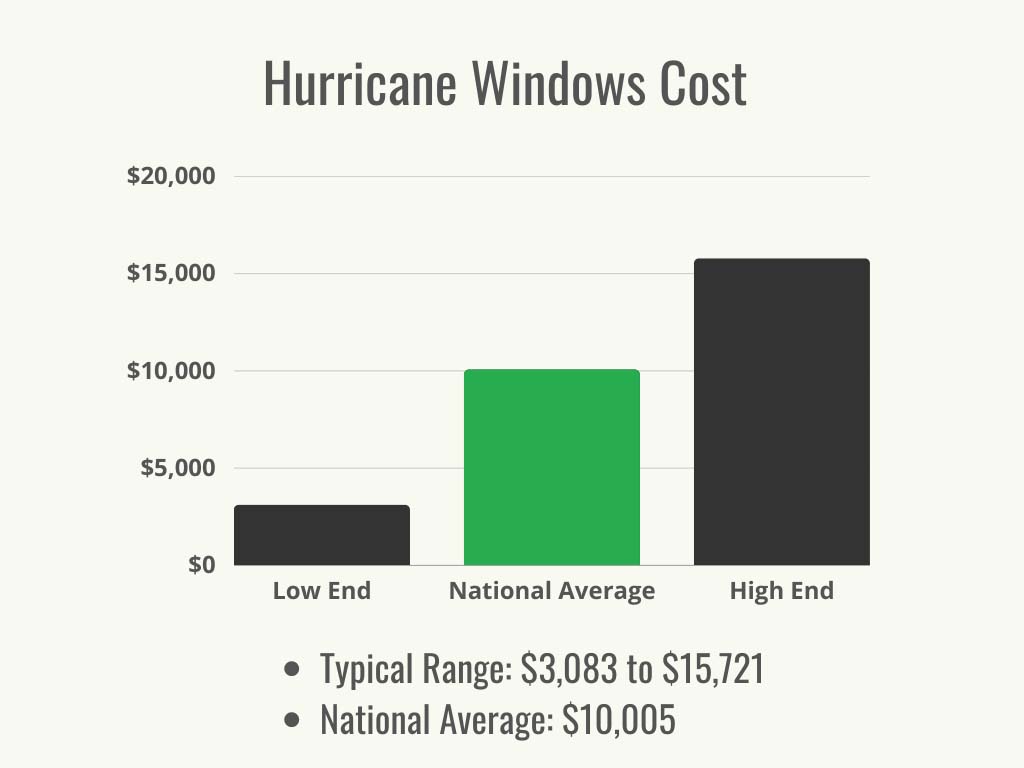

We may earn revenue from the products available on this page and participate in affiliate programs. Learn More ›
Highlights
- The typical range for hurricane window costs is $3,083 to $15,721, with a national average of $10,005.
- Hurricane window costs are determined by the window size, shape, style, and material, as well as frame material, track style, window brand, number of windows, labor costs, installation location, and permits.
- Hurricane windows can provide protection from weather and storms, noise reduction, increased energy efficiency, home security, home value, and reduced insurance costs.
- Homeowners are encouraged to leave hurricane window installation to a professional. Improperly installed hurricane windows are significantly less effective and could damage the home over time.
Installing high-impact windows is a worthwhile investment for homeowners who live in hurricane-prone regions. Some locations along the southeastern and eastern coasts of the United States have mandatory regulations for protecting homes against the strong winds that come with the annual hurricane season. Made with impact-resistant glass treated with a resin layer of ethylene-vinyl acetate (EVA) or polyvinyl butyral (PVB), hurricane windows provide added protection against strong winds and flying debris. If the window is struck by a projectile, the glass may crack, but the coating will keep it attached to the window frame, resulting in fewer injuries from broken and flying glass. How much do hurricane windows cost? According to Angi and HomeAdvisor, hurricane impact windows cost from $3,083 to $15,721, with many homeowners paying $10,005 on average. While the cost of hurricane windows is more than standard window prices, hurricane windows offer protection against powerful storms and wind-borne debris.
The average cost of hurricane impact windows is affected by window size, window type and style, frame material, installation location, number of hurricane windows needed, and any custom additions, among other factors. Hurricane windows can cost from $100 to $2,100 per window. Typically, aluminum-frame material is the most budget-friendly, while wooden frames cost considerably more. Larger, ventilating hurricane windows with additional custom add-ons, such as privacy or energy-efficiency coatings, and custom-colored frames or grids can cost upwards of $15,000.
Labor costs to install hurricane windows typically range from $80 to $400 per window, or about $30 to $65 per hour. It usually takes around 2 hours to install a hurricane high-impact window. Homeowners are advised to keep in mind that labor costs can be higher in densely populated urban areas than in suburban or rural locations. Below are important factors that affect hurricane window prices, different types of hurricane windows, and the benefits of installing high-impact hurricane windows.
Factors in Calculating Hurricane Windows Cost
How much is a hurricane window? That depends on several factors. Prices can vary from the national average due to window size and shape, window style, window material, frame material, track style, window brand, project scope, labor costs, installation location, and permit fees. Homeowners can use a hurricane impact windows cost calculator or factor in the following prices to come to a rough estimate.
Window Size and Shape
The average cost of high-impact windows is about $55 to $62 per square foot, but custom-made windows can increase the price to at least three times more. Window size is one of the most significant factors when it comes to impact windows cost. The larger the window, the higher the cost. Custom designs, unusually sized, or oddly shaped windows will also cost more to install. What follows are some common sizes for high-impact hurricane windows and the average cost for installation.

Standard-size rectangular windows will have a cost close to these averages, while round or custom-shaped hurricane windows will likely cost even more to install.
Window Style
Just like standard windows, hurricane-proof windows come in differing styles that can impact the overall price. The following are some common hurricane window styles and the average price per window.
- Architectural hurricane windows. Available in a considerable range of custom sizes and shapes, architectural windows provide a unique aesthetic expression to match the architectural style of the home. Protecting one-of-a-kind windows with high-impact hurricane windows can cost between $350 and $2,100 each.
- Double-hung hurricane windows. With a double-hung window, both the upper and lower sashes move for increased airflow. These high-impact storm windows cost from $450 to $1,700 each.
- Fixed hurricane windows. Made of one pane of glass, fixed windows do not open. The average price ranges from $100 to $1,600 per window, depending on size.
- Single-hung hurricane windows. One of the most popular window styles, single-hung windows have an upper sash that remains stationary while the lower sash moves up and down. Single-hung hurricane windows range from $300 to $1,500 each.
- Sliding hurricane window. Sliding sash windows work like a single- or double-hung window, but they slide horizontally instead of vertically. These protective hurricane windows run from $550 to $1,400 each.
Window Material
Window materials such as weatherstripping and window film can drive up hurricane-rated windows cost. Weatherstripping to improve window insulation can cost around $275 for all the windows in a house. Hurricane protective film can run about $350 for 75 square feet of film. This amount can cover up to 10 windows that measure 24 by 36 inches each.
Impact-resistant hurricane windows are typically constructed of two panes of glass with protective material in between. The material increases the strength of the window and makes it shatter-resistant in the event of a powerful storm. The most budget-friendly option is to install hurricane windows that have polyvinyl butyral (PVB) as the protective layer. Combining PVB with ethylene-vinyl acetate (EVA) increases the strength but also the cost. The average price of hurricane windows goes up even more when PVB is used with polyethylene terephthalate (PET) between the panes, creating the most expensive premium hurricane windows.
Frame Material
Hurricane window frames are usually made from aluminum, vinyl, or wood. Each material has its own qualities, appearance, benefits, maintenance level, and cost. Some frame materials provide better insulation, while other materials are considered more aesthetically pleasing. The frame material greatly impacts the hurricane window installation costs. Listed below are the different frame materials and their average prices.
| Frame Material | Cost per Window |
| Aluminum | $90 to $275 |
| Vinyl | $100 to $300 |
| Wood | $175 to $400 |
- Aluminum hurricane window frames. Aluminum frames are typically the most budget-friendly option, ranging in price from $90 to $275 per window, depending on style and size. Aluminum isn’t as insulating as other hurricane frame materials, but it is low maintenance. Keep in mind that aluminum frames can fade and require intermittent repainting.
- Vinyl hurricane window frames. Vinyl insulates better than aluminum and is a low-maintenance material. It typically has less style and fewer color options, but there are combination vinyl-and-wood frames available that offer a higher level of insulation and are even easier to maintain. Vinyl hurricane window frames cost from $100 to $300 per window, depending on the style and size.
- Wood hurricane window frames. Many homeowners prefer wooden hurricane window frames due to their natural look and outstanding insulating properties. They require more maintenance than aluminum and vinyl frames since they need to be stripped, sanded, and repainted periodically. Because wood expands in hot weather and contracts in cold weather, wood frames aren’t recommended for homes in locations where the temperature fluctuates drastically throughout the year. Wood hurricane window frames cost from $175 to $400 per window.
Track Style
Along with shape, size, and style, hurricane windows can be categorized by track style. The window track allows the window panes to slide open and closed, but there are some track styles that are fixed in place and prevent movement. Outlined below are the different track styles and their price ranges, not including labor.
| Track Style | Cost |
| Fixed-track | $100 to $300 |
| Two-track | $100 to $350 |
| Triple track | $150 to $400 |
| Two-track Sliding | $150 to $400 |
- Fixed-track hurricane window. Fixed hurricane windows, such as picture or casement windows, do not open and remain in place. These windows are constructed of a single pane of glass and cost from $100 to $300 per window, depending on size.
- Two-track hurricane window. A two-track hurricane window has a screen and two panes of glass. The exterior has a pane of glass at the top and a screen at the bottom. These two are fixed in place and do not move. On the inside is another pane of glass that moves up and down to open and close the window. A two-track hurricane window costs from $100 to $350 per window.
- Triple-track hurricane window. A triple-track hurricane window has a screen and two panes of glass that can all move up and down as needed. These popular hurricane windows range from $150 to $400 per window.
- Two-track sliding hurricane window. A two-track sliding hurricane window has two tracks that can slide from side to side. This type of hurricane window is often used on larger, wider windows to allow more airflow into the home. These hurricane windows cost from $150 to $400 each.
Window Brand
The brand of hurricane window will affect the overall installation cost. Some brands provide more customization options, and others offer more budget-friendly choices. Some reputable hurricane window brands, the price to install a single window, and the price for a whole-home installation (including materials and labor) are provided below.
Number of Windows
The price to install hurricane windows can vary according to the number of windows that are needed. Typically, the more windows a home has, the more expensive the project will be. Homeowners can expect to pay anywhere from $100 to $2,100 per hurricane window, depending on size, shape, style, and material.
Labor
Impact-resistant window installation prices can differ greatly depending on the window location, size, shape, material, and condition of the existing frame. Hurricane windows take approximately 2 hours to install; labor costs usually range from $80 to $400 per window, or about $30 to $65 per hour. Some window companies may offer a discount to homeowners installing multiple windows at the same time. Homeowners can double-check with a window professional regarding their labor-cost policies.
Installation Location
Window location also affects hurricane windows cost. Windows on the second floor typically take twice as long to install as windows on the first floor of a home and will drive up labor costs. Hurricane windows can be installed on the interior and exterior of the window, and the type of installation directly affects the price of labor and materials. Interior hurricane windows cost about $24 per square foot, or $250 to $400 per panel, and exterior storm windows cost up to $62 per square foot.
Interior storm windows are excellent options for homeowners who live in historic homes and do not want to change the look of the windows or are restricted by historic-preservation ordinances. They are also a good option for renters who cannot make permanent changes to the outside. These windows attach to the interior frame and can be installed and removed as necessary. They’re made from one panel and are typically easy to install. Since they’re installed on the inside, they leave the exterior window pane vulnerable to damage from strong winds or flying debris, but they provide an extra layer of protection for the inside of the home.
Exterior storm windows are a more common choice for homeowners. These permanent hurricane windows need to be installed by a window professional. Instead of having one panel, exterior storm windows can have two or three tracks that allow the window or screen to be opened for increased airflow during seasonable weather.
Permits
Permit requirements and costs vary by state, county, and city, but homeowners typically pay permit fees of $50 to $200 for hurricane windows installation. It’s common for the window installation company to acquire the permit as part of the installation project, but homeowners will always want to double-check to be certain.
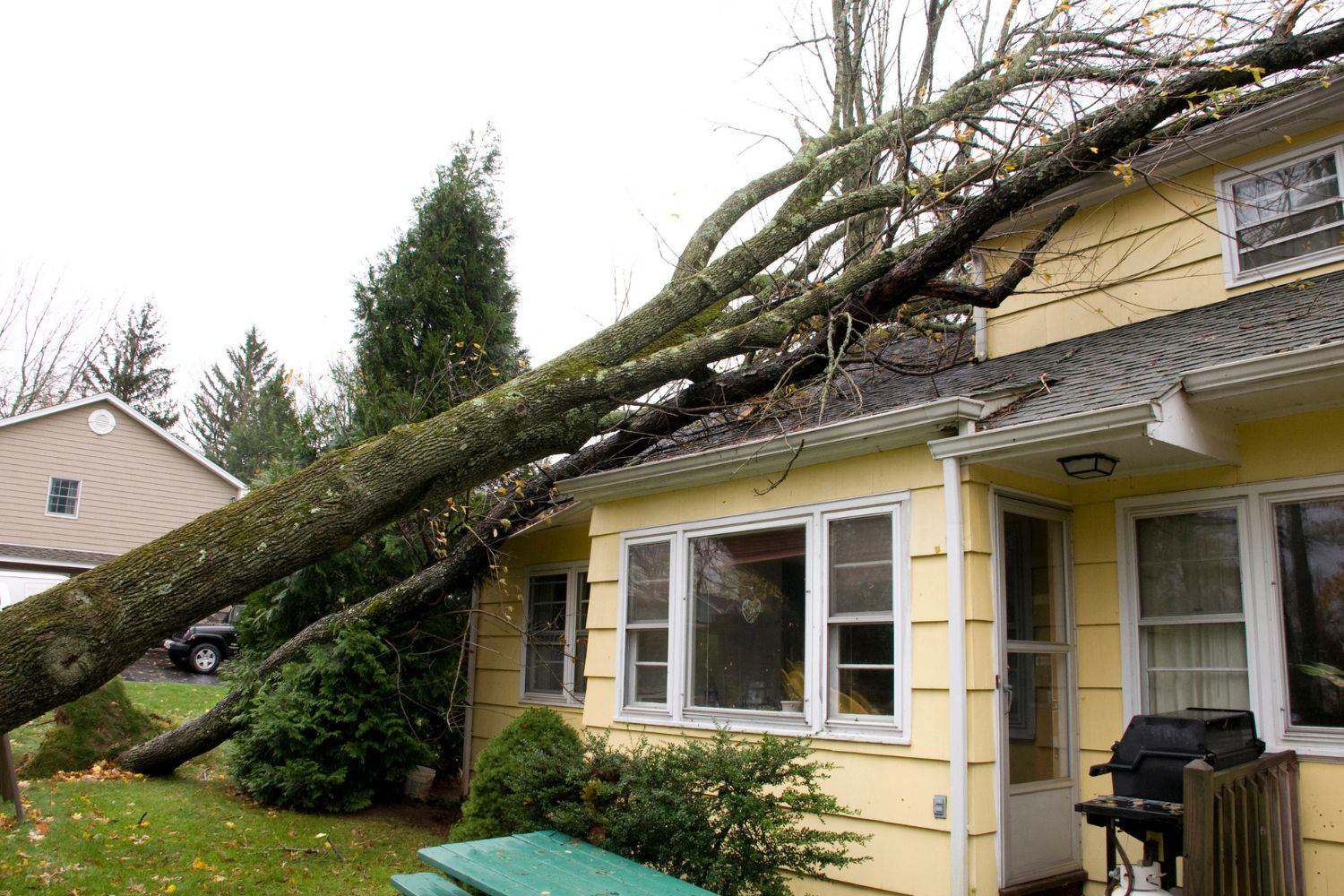
Additional Costs and Considerations
When budgeting for hurricane windows cost, homeowners will benefit from knowing about any additional costs and considerations that can increase the price of the installation project. These can include window replacement cost compared to new window installation cost; the choice of windows, shutters, or film; customizations; and tax deductions.
New vs. Replacement
If the old storm windows are being replaced with new hurricane windows, homeowners can expect to pay an additional $50 per window to remove the old windows. This additional price can vary due to the location, size, and the complexity of window removal.
Prefabricated vs. Custom
Depending on the house, homeowners will need to decide whether they need custom windows or if they can choose from a selection of prefabricated windows that their selected brand offers. Custom hurricane windows may be necessary for homes with windows that are not a standard size or shape. Prefabricated windows can cost $100 to $400 apiece. As may be expected, custom windows are usually more expensive at $150 to $1,000.
Windows vs. Shutters vs. Window Film
Hurricane windows provide impact resistance from flying debris during strong storms or hurricanes. The best storm windows also provide additional insulation and lessen the noise pollution coming from outside. Additionally, hurricane shutters protect windows against damaging projectiles. However, they don’t insulate well or dampen noise from the outside, and they also need to be manually closed to protect the windows and opened after a storm has passed. If the choice is between installing hurricane shutters and boarding up the windows, shutters are a much safer option. Hurricane shutters cost $1,950 to $5,800, with the national average at $3,850. While some homeowners install hurricane shutters rather than hurricane windows, others opt to install both for added protection.
Some budget-conscious homeowners opt for hurricane window film to add protection to the windows in their home. Protective window film does not make the window impact-resistant, but it does prevent the glass from shattering during storms with strong winds. The price for a 75-square-foot roll of hurricane window film runs about $350. One roll can cover approximately 10 windows that measure 24 by 36 inches each. Installation costs range from $30 to $65 per hour, with many installation projects taking 1 to 2 hours.
Customizations
Additional features can increase the cost of impact windows. These customizations can increase the insulating properties, durability, and ventilation.
| Customization Type | Cost (Materials Only) |
| Adjustable ventilation stops | $10 to $50 per set |
| Double-pane windows | $50 to $100 per window |
| Stabilizer bars | $20 to $40 per bar |
| Weatherstripping | $275 |
- Adjustable ventilation stops. Adjustable ventilation stops are located on the inside window track and are used to limit the movement of the sash. A set can cost from $10 to $50.
- Double-pane windows. The price for double-pane windows ranges from $50 to $100 per window. They are constructed of two panes of glass that are separated by the frame.
- Stabilizer bars. Stabilizer bars improve the strength and structural integrity of the hurricane windows, increasing their durability and lengthening their lifespan. They cost from $20 to $40 per bar.
- Weatherstripping. Adding weatherstripping around storm windows increases insulation by sealing the edges against cold or hot air entering the home. This can also be done around the outside doors for added protection. Installing weatherstripping for an entire home can be done for approximately $275.
Tax Credits
When installing impact-resistant windows, homeowners can take advantage of the Windows & Skylights Tax Credit, which allows them to recoup some of the cost of hurricane windows and doors. The windows must be Energy Star rated, and homeowners can receive a credit of 30 percent of the project cost with a maximum of $600 total.
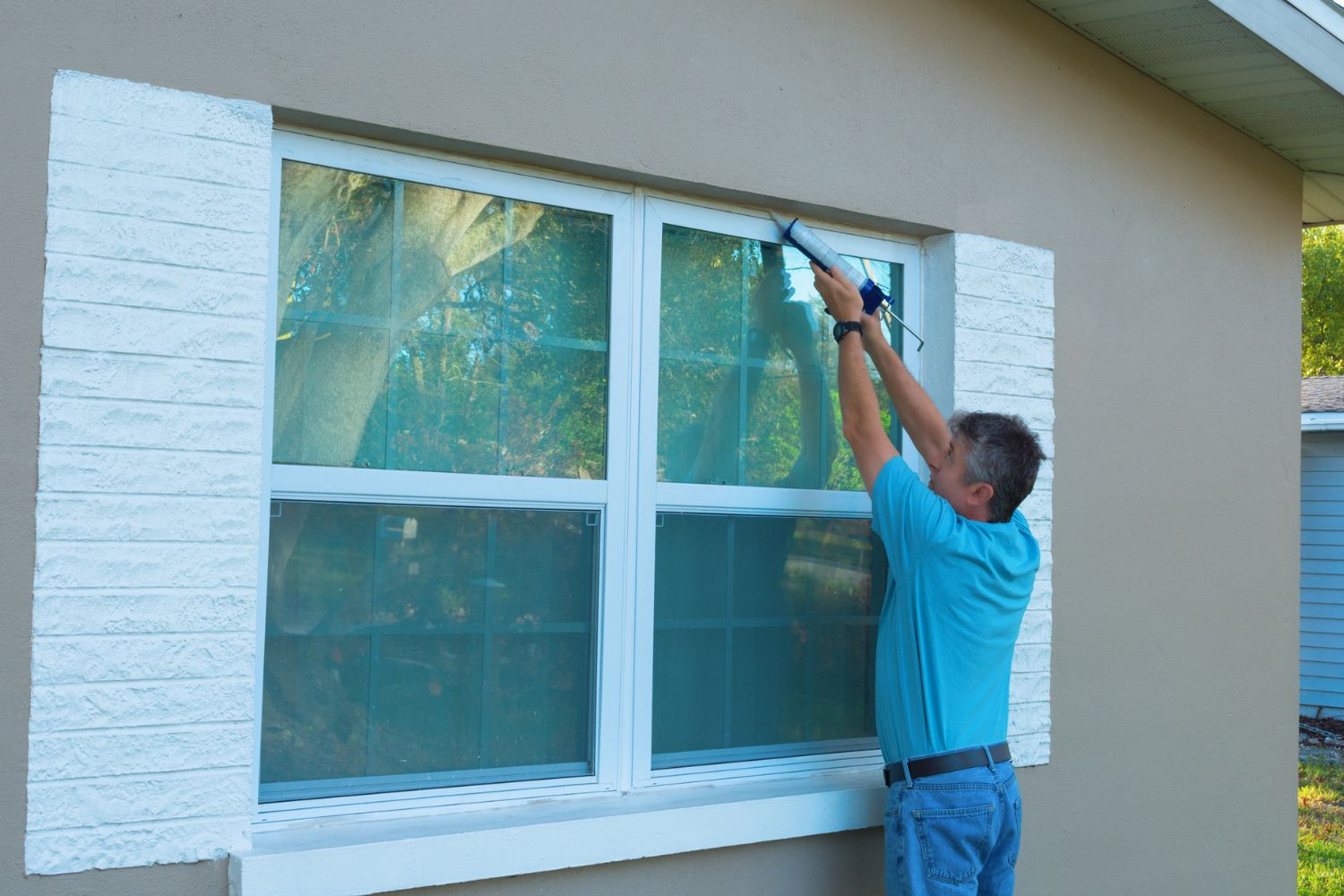
Types of Hurricane Windows
Hurricane windows have different glass or pane options. Each has its own advantages, functions, costs, aesthetics, and durability. Some windows are more energy-efficient and durable, while others may be more budget-friendly but provide less impact resistance. What follows are the most common types of hurricane windows and their average cost per window.
| Window Type | Cost |
| Acrylic | $100 to $250 |
| Double-pane | $150 to $400 |
| Laminated | $150 to $400 |
| Low-E | $125 to $400 |
| Plexiglass | $100 to $250 |
| Standard | $100 to $300 |
| Tempered | $150 to $400 |
| Tinted | $125 to $400 |
Acrylic
Acrylic window panes are flexible, light, and most times stronger than standard glass panes. Acrylic storm windows cost from $100 to $250.
Double-Pane
Double-pane storm windows come in varying styles and sizes to match a home’s exterior appearance. They’re made of two panes of glass separated by the window frame. The price for double-pane storm windows ranges from $150 to $400.
Laminated
Laminated storm window panes add extra protection against sun fade and noise pollution. They are shatter-resistant and more durable than standard glass panes. Laminated panes cost from $150 to $400.
Low-E
Low-e glass panes are energy-efficient and coated in a layer that reflects heat back into the room rather than outside. Popular for its energy-saving qualities, low-e glass costs from $125 to $400 for hurricane windows.
Plexiglass
One of the most budget-friendly hurricane window options, plexiglass is a flexible plastic. Light and easy to work with, plexiglass is usually stronger than glass, but it can scratch easily and turn yellow over time. The cost of durable plexiglass storm windows runs from $100 to $250.
Standard
Standard glass hurricane window panes are not treated, altered, or tinted. These 3/16-inch glass panes are the most common types of storm windows. Standard panes can range in cost from $100 to $300.
Tempered
Tempered glass hurricane windows are often used in locations at high risk for powerful storms. Sometimes called toughened glass, tempered glass goes through a chemical or thermal process to increase the strength and durability. This shatter-resistant glass typically costs between $150 and $400.
It’s important for homeowners to note that tempered glass and impact-resistant glass are not the same. When tempered glass breaks, it fragments into small pieces in a process called dicing. Dicing reduces the risk of injury from broken or jagged glass.
Tinted
Tinted hurricane windows allow for more privacy and can change the look of the home’s exterior. A metal oxide coating is put on the window to change the color of the pane. The cost of tinted hurricane window panes ranges from $125 to $400.
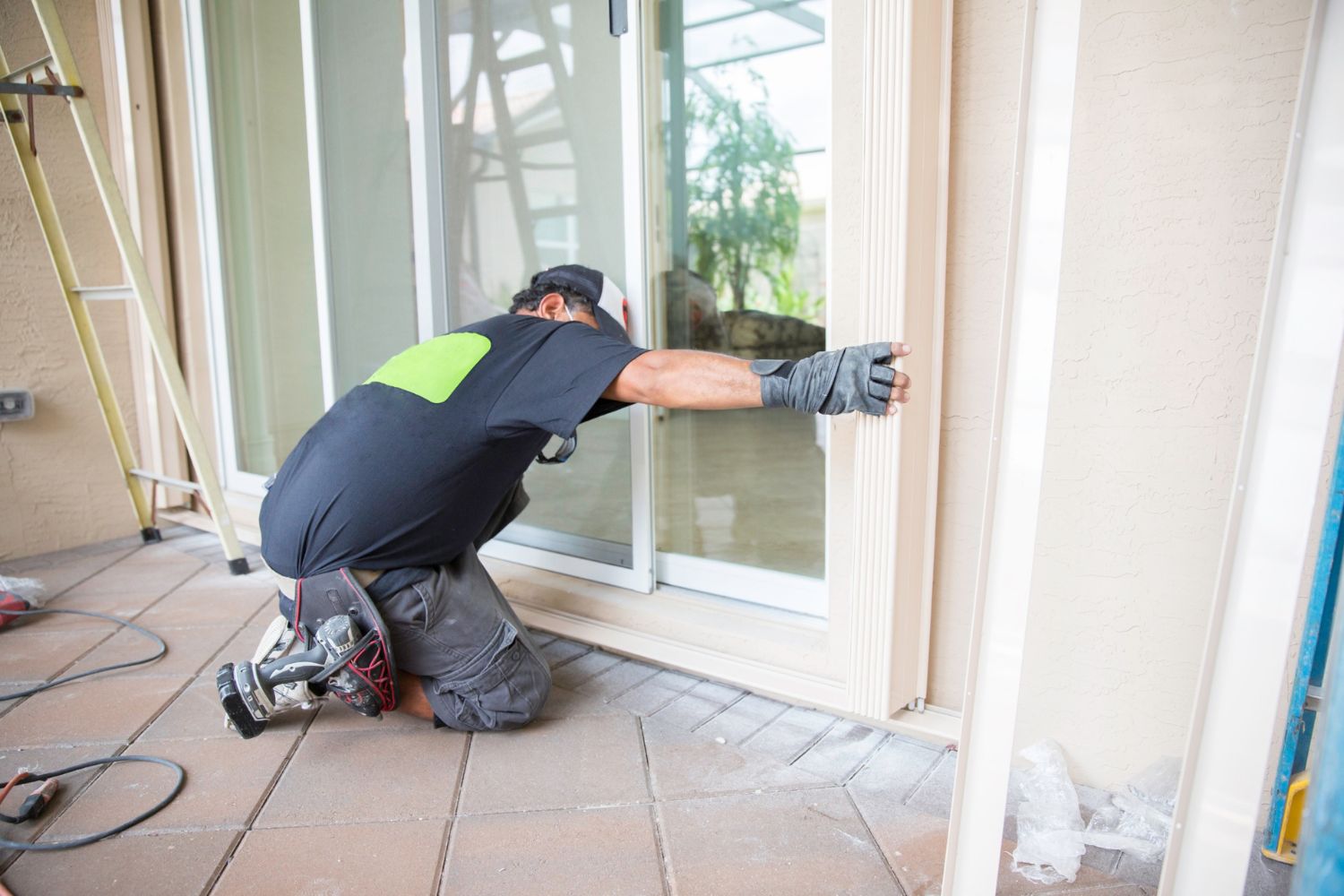
Do I Need to Install Hurricane Windows?
Homeowners who live in hurricane-prone areas or locations that experience strong storms will want to consider hurricane window protection for their home. Some states even have mandates or regulations regarding hurricane windows. While admittedly expensive, hurricane windows provide valuable protection. Along with holding out against strong winds and wind-borne debris, storm windows also provide additional insulation and reduced noise pollution.
State or Building-Code Mandates
Some homeowners in hurricane-prone areas may not have a choice regarding hurricane window installation. Areas that are considered high-velocity hurricane zones (HVHZ) have state or building-code mandates that require the installation of hurricane windows rated for protection against winds up to 200 mph. After the destructive path of Hurricane Andrew in 1992, Florida enacted stricter performance and construction requirements for glass doors and exterior windows—and other states followed suit. Alabama, Connecticut, Delaware, Florida, Georgia, Maryland, Massachusetts, Mississippi, New York, North Carolina, Pennsylvania, Rhode Island, South Carolina, Texas, and Virginia require impact-resistant windows for all new construction and building remodels.
History of Severe Storms
Living in an area that has a history of severe storms can make hurricane-season preparation stressful. Homeowners who install impact-resistant hurricane windows to hurricane-proof their home have one less item to think about when prepping for hurricane season. Installing hurricane windows to a home is an added expense but also a good way to protect that investment.
Benefits of Installing Hurricane Windows
Hurricane windows protect not only against strong storms but also against sudden pressure changes, which can cause structural damage inside a home. Along with noise reduction, increased energy efficiency, reduced home insurance costs, improved home security, and a boost to a home’s value, installing hurricane windows has many advantages.
Weather and Storm Protection
Hurricane windows protect against severe weather, strong wind, and wind-borne debris. Stronger than standard glass, hurricane windows provide protection against severe storms with strong frames.
Noise Reduction
Hurricane windows are effective at reducing outdoor noise pollution such as loud traffic and people. Diminishing the amount of noise pollution that reaches the inside of the home is beneficial for homeowners wanting to sleep, focus, work, or relax.
Increased Energy Efficiency
Another important advantage of installing hurricane windows is their increased energy efficiency. Since many storm windows are made from two or three panes of glass, they can help save money on heating and cooling costs. The tight seal of impact-resistant hurricane windows ensures that cool air will not escape during the hot summer months and that warm air will stay inside during the winter.
Improved Home Security
Intruders may be able to break into a home through standard glass windows, but the strength of hurricane windows can help prevent break-ins and provide additional security. Some impact-resistant hurricane windows are recessed into the window frame for improved home security.
Increased Home Value
In addition to protecting against storm damage, hurricane windows can boost a home’s value. It’s common for hurricane windows to have 75 percent to 85 percent return on investment (ROI) when the time comes to sell the house.
Reduced Insurance Costs
Making the investment in hurricane windows may qualify homeowners for a reduction in homeowners insurance costs. Many insurance companies offer lower rates to homeowners installing impact-resistant hurricane windows. It’s recommended that homeowners check with their insurance company to see if they qualify for a reduced rate.
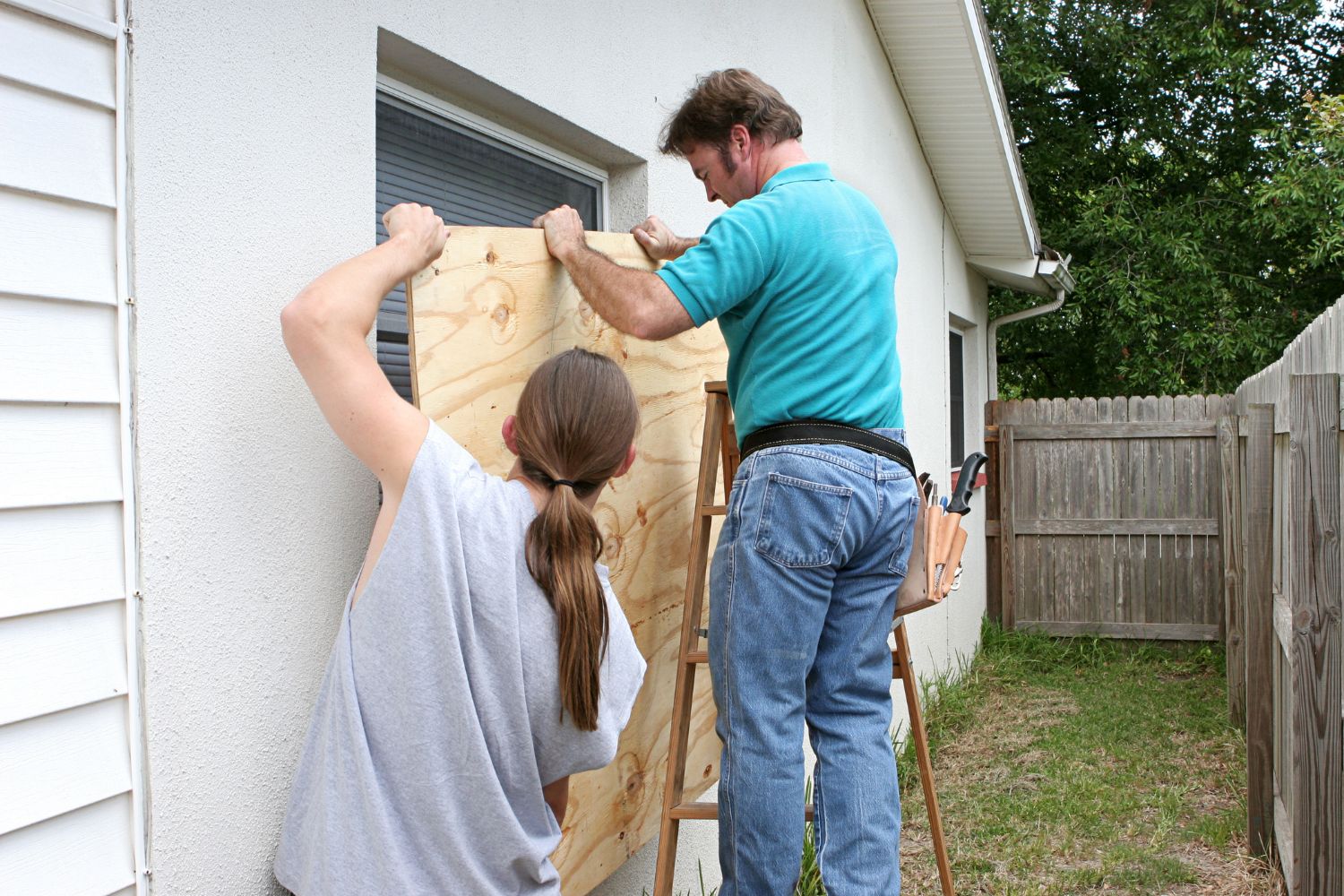
Hurricane Windows Installation: DIY vs. Hiring a Professional
Installing hurricane windows as a DIY project isn’t recommended. While it may be tempting for a homeowner to save money on labor by tackling the project on their own, measuring, sizing, securing, and sealing the windows correctly can be tricky. Removing the old windows can also affect the outside siding and may cause damage to the wall. Ensuring the work is done properly is better left to a professional, especially as an incorrect installation can void the manufacturer warranty. The best window replacement companies, such as Renewal by Andersen, typically warrant their work and any nonglass material. Homeowners will want to keep in mind that hurricane window installation includes not only putting in the windows but removing the old windows and disposing of them, adjusting and repairing the existing window frames, caulking, positioning the new hurricane windows, adjusting the expanders, and securing the new windows. This process will take longer for windows on the upper floors of a home, typically doubling the installation time.
Interior storm window installation is a project that can be completed by most homeowners, since it involves easily sliding the storm window into place from the inside. Hurricane window film is another DIY-friendly option that many homeowners opt to do on their own.
How to Save Money on Hurricane Windows Cost
Homeowners may experience sticker shock when finding out how much hurricane windows cost, not to mention the additional costs associated with the installation. Choosing the cheapest hurricane window option is one way to save money, but there are other ways to save without compromising on quality or specific features.
- Get multiple quotes. Don’t be afraid to shop around and get at least three quotes from reputable window installation companies in your area.
- Schedule the project before hurricane season. Some companies may offer installation discounts before hurricane season begins. Check with local window companies to see if they have specials.
- File that tax return. Homeowners are eligible for a tax credit thanks to the Bipartisan Budget Act of 2018. After installation, they can claim 10 percent of the cost up to $200 per window.
- Avoid the extras. If window tinting doesn’t fit into the window installation budget, focus on what’s necessary to protect your home during a hurricane.
- Check your insurance. Double-check your homeowners insurance policy to see if discounts are available for installing hurricane windows. If not, it may be time to look into how to get hurricane insurance. The savings can add up significantly year after year.
Questions to Ask About Hurricane Windows Installation
Asking a window professional the right questions can help minimize miscommunication and get the best results. Below are some questions homeowners can ask about hurricane window installation before deciding on the right professional.
- Do you give free estimates?
- How much do high-impact windows cost?
- Will you provide references?
- Do you have examples of your previous work?
- Do you have liability insurance and workers’ compensation insurance?
- Are you licensed? (Some states and cities require licensure for contractors.)
- What certifications do you have?
- How long has the company been in business?
- What are the payment terms?
- Who will install the hurricane windows?
- How long will the window installation take?
- How will the weather affect the installation project?
- How will my home be protected during installation?
- How will you clean up after the installation?
- Do you do trim work?
- What types of warranties do you offer?
- Where can I leave a review?
FAQs
Before hiring a hurricane window installation professional, it’s vital to have all the necessary information regarding hurricane window installation and the associated costs. What follows are several frequently asked questions about hurricane windows and the installation project to help guide this decision-making process.
Q. Should I install hurricane windows if I don’t live in a place that gets hurricanes?
Some homeowners who do not live in hurricane-prone areas choose to install impact-resistant hurricane windows for a few reasons. Hurricane windows are energy efficient; they prevent cold air from seeping in during the frigid winter months, and they keep the cool, conditioned air inside during the hot summer months. This results in increased energy savings and lowered heating and cooling bills. They can also protect against impact damage from a rogue baseball or golf ball and decrease home insurance premiums.
Q. Do hurricane impact windows increase home value?
Not only do impact-resistant hurricane windows increase the value of a home and offer a return on investment (ROI) of between 75 percent and 85 percent, they also improve curb appeal, increase energy efficiency, and make the home safer from potential break-ins.
Q. Are there any drawbacks to installing hurricane windows?
One drawback to installing hurricane windows is that the cost of hurricane windows vs. regular windows is several thousand dollars higher. Another drawback is that some hurricane windows are thicker than standard windows and can yellow over time, impairing visibility. Hurricane windows can also be a needless expense in locations where the threat of powerful storms or hurricanes is remote.
Q. Are hurricane windows better than shutters?
Homes that have hurricane windows do not need hurricane window shutters, although some homeowners opt for both. If hurricane shutters are installed over old windows, the windows can still get damaged from strong winds during a storm. The pressure can pull the windows out of the frame, leaving the home vulnerable to water and structural damage. Installing new non-hurricane windows and hurricane shutters would be more expensive than deciding on hurricane windows alone. Many homeowners prefer hurricane windows, since they don’t have to install and uninstall them anytime there might be a threat of a strong storm or hurricane as they would with hurricane shutters. Another option for homeowners to look into is the cost to build a hurricane-proof modular home—though most will likely prefer to change their windows rather than build an entirely new house.
Q. Are impact windows the same as hurricane windows?
The terms “impact windows” and “hurricane windows” are used interchangeably. Hurricane windows or impact windows will protect a home from strong winds, flying debris, and other objects that are thrown at the window.
Q. Which are better: hurricane shutters or hurricane windows?
Even the best hurricane shutters technically don’t offer the same level of protection as hurricane windows. To protect a home against powerful storms, hurricanes, and all types of wind-borne debris, hurricane windows are usually the best option.
Sources: Angi, HomeAdvisor, Fixr, Window Price Guide, STS Impact Windows and Doors, Max Guard Hurricane Windows
